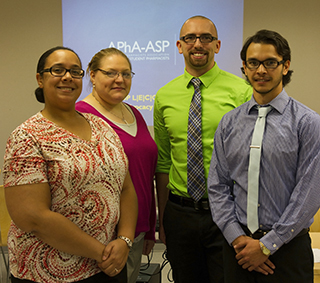Doctor of Pharmacy students (Pharm.D.) at the Lake Erie College of Osteopathic Medicine (LECOM) are joining pharmacy organizations and associations nationally in calling for pharmacists to be formally recognized as health care providers.
The LECOM chapter of the American Pharmacists Association-Academy of Student Pharmacists (APhA-ASP) recently held a Professional Awareness and Advocacy Lunch in conjunction with October as American Pharmacists Month. Much of the discussion focused on the importance of students taking an active role in helping to advance the profession.
Currently, pharmacists and pharmacists’ patient care services are not included in key sections of the Social Security Act (SSA), which determines eligibility for programs such as Medicare Part B. In some cases, the failure to recognize pharmacists as “listed providers” within the health care system limits Medicare beneficiaries’ access to pharmacists’ services in outpatient settings.
Hershey S. Bell, M.D., M.S., F.A.A.F.P., Professor, Vice President for Academic Affairs and Dean, LECOM School of Pharmacy, attended the lunch in support of the students. “Part of our responsibility is to educate the next generation of pharmacists to advocate for the issues that can advance the quality of care in the United States, such as pharmacists becoming recognized as health care providers,” Dr. Bell said. “It’s imperative that we encourage this advocacy role for the profession to the same degree that we encourage the development of competence and compassion as a Doctor of Pharmacy.”
In addition, Christopher Sedgwick, president of LECOM’s APhA-ASP chapter, and Alexander Covey, policy vice president for the chapter, spoke to their fellow students about changing a policy many believe to be outdated and not reflective of the demands on and responsibilities of professional pharmacists.
 |
| Doctor of Pharmacy students (left-right) Jennifer Addo, Beth Miller, Alexander Covey and Chris Sedgwick recently spoke to their fellow students about the importance of pharmacists being formally recognized as health care providers. |
“There is overwhelming research indicating that pharmacists play a critical role in our health care system and are able to reduce the costs of health care by virtue of their training in managing chronic diseases,” Covey said.
Changing the status quo for pharmacists is a key focus and strategic priority of organizations such as the APhA as well as the American Society of Health-System Pharmacists (ASHP) and the American College of Clinical Pharmacy (ACCP).
Despite being trained in chronic disease management, medication monitoring, patient education, medication reviews, coordination of medications in transitions of care, prevention and wellness, pharmacists are often regarded as the most underutilized health care providers, Sedgwick noted. The reality is that pharmacists devote much of their time to dispensing prescriptions, and tend to be limited in terms of opportunities to use their clinical skills.
Paul Abramowitz, Pharm.D., CEO of the American Society of Health-System Pharmacists, is among those making the case for pharmacists being accorded provider status, saying the time has come, especially in light of the Affordable Care Act and its impact on health care. Dr. Abramowitz recently wrote, “It is essential to recognize pharmacists for the patient care providers that they already are… Pharmacists today are clinical practitioners who provide distinct direct patient-care services, serving as both pharmacy generalists and specialists. This fact is not in dispute.
“In today’s health care environment, where improving quality of care and decreasing costs are the focus of health care reform, there could not be a better time to recognize pharmacists as providers and as the medication-use experts on the interprofessional team,” Dr. Abramowitz added.
Beth Miller, LECOM’s student liaison to the Pennsylvania Pharmacists Association, and Jennifer Addo, president of the LECOM chapter of the Student Society of Health System Pharmacists, spoke to their fellow students during the lunch. Miller and Addo also encouraged the students to be advocates for the profession, including participating in the APhA-ASP Policy Postcard Challenge. Postcards will be addressed to legislators and written from the perspective of patients explaining the value of student pharmacists and the health care services student pharmacists and pharmacists can provide.
The participating students also had the opportunity to meet with representatives from the office of State Senator Sean D. Wiley of Pennsylvania.

